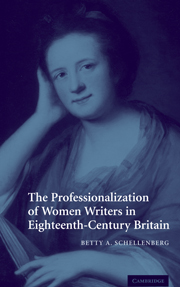Book contents
- Frontmatter
- Contents
- Acknowledgments
- A note on citations
- Introduction: “building on public approbation”
- 1 Frances Sheridan, John Home, and public virtue
- 2 The politicized pastoral of Frances Brooke
- 3 Sarah Scott, historian, in the republic of letters
- 4 The (female) literary careers of Sarah Fielding and Charlotte Lennox
- 5 Harmless mediocrity: Edward Kimber and the Minifie sisters
- 6 From propensity to profession in the early career of Frances Burney
- 7 Women writers and “the Great Forgetting”
- Coda
- Notes
- Bibliography
- Index
1 - Frances Sheridan, John Home, and public virtue
Published online by Cambridge University Press: 12 November 2009
- Frontmatter
- Contents
- Acknowledgments
- A note on citations
- Introduction: “building on public approbation”
- 1 Frances Sheridan, John Home, and public virtue
- 2 The politicized pastoral of Frances Brooke
- 3 Sarah Scott, historian, in the republic of letters
- 4 The (female) literary careers of Sarah Fielding and Charlotte Lennox
- 5 Harmless mediocrity: Edward Kimber and the Minifie sisters
- 6 From propensity to profession in the early career of Frances Burney
- 7 Women writers and “the Great Forgetting”
- Coda
- Notes
- Bibliography
- Index
Summary
I am obliged to break off, as I have been interrupted a dozen times since I sat down to write. Indeed I am so distressed for want of a room to myself, that it discourages me from attempting any thing, though I have this winter made a shift to scribble something that you shall hear of another time.
(Frances Sheridan to Samuel Whyte, 1762)In a word, as we entertain the highest opinion of the genius, delicacy, and good sense of Mrs. S ——, we cannot but wish she may continue to exert those talents, so honourable to herself, so useful, so entertaining to society, and particularly so beneficial to the republic of letters.
(The Critical Review 11 [March 1761])As I noted in my introduction, scholars have recently questioned the assumption that as a bourgeois public sphere emerged in eighteenth-century Britain, women, severely restricted in political, legal, and economic power, were aligned entirely with an opposing private sphere. According to Lawrence E. Klein, the problem with the “domestic thesis” is that it does not account for the distinction between theory and practice, whereas the evidence indicates that “women in the eighteenth century had public dimensions to their lives.” “Moreover,” he concludes, “… engaging in those public practices involved a consciousness that they were behaving publicly.” Klein goes on to suggest that such public dimensions are made conceptually possible by the multiple sets of distinctions for which no one theory, particularly not one dependent on binary oppositions, could ever account.
- Type
- Chapter
- Information
- Publisher: Cambridge University PressPrint publication year: 2005



